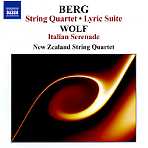Perhaps it’s the passage of time, or it’s simply the New Zealand String Quartet’s embracing, unselfconscious style and illuminating technique, but the atonal sounds of Alban Berg’s String Quartet Op. 3 sure seem a lot closer to late-19th century romanticism than they did 40 or so years ago when listeners in my generation first paid attention to Berg’s music. And since the work was written almost 100 years ago, that’s as it should be, as is the fact that it’s now much easier to get past the larger and still-challenging sonic picture to appreciate the inner textural and motivic details.
Of course, our ability to really hear and follow what’s going on depends on the performance–and these four musicians may be the best on disc (surpassing the Leipzig and Pražák quartets) in all-important matters of linear clarity, dynamic shading, and sustaining the developmental tension throughout Op. 3’s two long, difficult movements. In the Lyric Suite, ensemble unanimity and precision in the increasingly fast odd-numbered movements is critical, and the New Zealanders not only accomplish this but also never forget the intrinsic drama and emotional intensity that haunts this music, especially impressive in the Allegro misterioso and Adagio appassionato movements at the heart of the work.
Indeed, as you listen to these works afresh, you not only marvel at the individual players’ virtuosity, but you also have to appreciate that the relatively warm yet pleasingly “edgy” quality to the sound and the oneness of spirit in the interpretations come from the highest-order functioning of the well-integrated collective parts of a mature, vital body–that is, a string quartet that’s been together a long time, each member sharing life and breath in the music they make together. This is one reason we listen to the great string quartets–and besides the chance to hear Berg’s fascinating and formidable scores again, that’s the reason you shouldn’t miss this extraordinary recording. (Incidentally, before Naxos releases this quartet’s upcoming Mendelssohn cycle, the label might want to correct its misspelling of cellist Rolf Gjelsten’s name.) [9/13/2007]
































